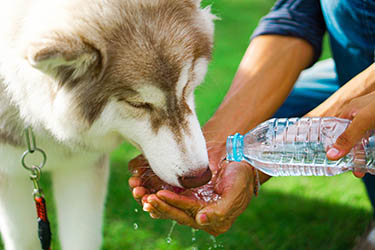July is National Pet Hydration Month

National Pet Hydration Month provides the opportunity to remind clients about the dangers of dehydration and overhydration
With rising summer temperatures, July has been established as National Pet Hydration Month. While keeping water available to indoor and outdoor pets may seem like common sense, the summer heat provides an opportunity to educate your clients about the symptoms and dangers of dehydration and overhydration.
Remind your clients of the common symptoms of dehydration:
- Loss of appetite
- Reduced energy levels
- Lethargy
- Panting
- Sunken, dry-looking eyes
- Dry nose and gums
- Loss of skin elasticity
Demonstrate the skin elasticity test to your clients by showing them to gently pinch the animal’s skin between thumb and forefinger. Explain that skin will spring back into position in well-hydrated dogs, while it takes longer in dehydrated dogs.
Show your clients how to check their pet’s gums, checking for moist versus dry, tacky feeling gums or demonstrate how capillary refill time can take longer in dehydrated animals.
Increased water intake also is important to avoid urinary blockage in cats. Symptoms include
- Straining in the litter box
- Crying/howling
- Licking genitals or below base of tail
- Hiding
For those four-legged patients who can’t get enough of the pool, garden hose or swim time, it can help to state the dangers of water intoxication. Although hyponatremia is relatively rare, it is possible for dogs to ingest large quantities of water when splashing for extended periods of time. Symptoms of water intoxication include:
- Loss of coordination
- Lethargy
- Bloating
- Vomiting
- Glazed eyes
- Excessive salivation
- Difficulty breathing
- Seizures
- Coma
Promoting pet hydration within your practice
Do your clients know that as much as 80 percent of a pet’s body is water, compared to 55 to 60 percent in humans?
Remind them that the general rule for daily water consumption is one ounce of water per pound of body weight daily. If your client is concerned about whether or not their pets drink enough, consider sharing these tips.
- Always stock a fresh supply. You don’t like floaters in your cup. While pets may not be quite as picky, a clean supply is always more appealing.
- Clean the water bowl. A clean bowl is equally as important as fresh water. Wash water bowls daily to prevent bacteria growth.
- Keep it moving. Do you have a pet that likes to drink from the faucet? For pets that prefer moving water, pet fountains keep water circulating and your taps safely shut off! If you do opt for a water fountain, don’t forget to change the filter and clean per the manufacturer’s instructions.
- Consider adding wet food or supplementing with fresh raw fruits or vegetables for added water intake.
A change in amount of water consumption may also indicate illness. For example, dogs with pancreatitis, parvovirus or leptospirosis tend to drink less water, while bladder infections, Cushing’s disease and diabetes can lead to excessive thirst and drinking.
With these simple tips, pet owners can help to keep their pets safe, healthy and hydrated during the hot summer months.
The University of California Division of Agriculture and Natural Resources offers this resource to determine daily water requirements for large animals.
To learn more, contact your Covetrus representative at 855.724.3461 or online.
Sources:
https://www.akc.org/expert-advice/health/common-conditions/warning-signs-dehydration-dogs/
https://www.petsafe.net/learn/pet-fountains-urinary-health
https://healthypets.mercola.com/sites/healthypets/archive/2013/10/28/water-intoxification.aspx
https://healthypets.mercola.com/sites/healthypets/archive/2014/05/07/dog-water-consumption.aspx
https://www.petsafe.net/learn/pet-hydration-month
https://www.petmd.com/dog/nutrition/evr_dg_the_importance_of_water
http://www.ucanr.edu/sites/placernevadasmallfarms/files/90846.pdf
Need Regulatory Assistance
If you need help with regulatory or licensing issues, we're happy to help. We have a wide variety of resources to help you when issues arise.

Careers
Are you looking for a place to let your talents shine? At Covetrus, we help our practitioner customers better serve their patients and take pride in providing the best customer experience possible. Search our open positions to see our available opportunities.
Newsletter
Stay current with what’s going on with Covetrus, subscribe to receive our newsletter and email communications. Subscribers will receive the latest information in practice management, sales and marketing, animal health, and more.


Leave a comment